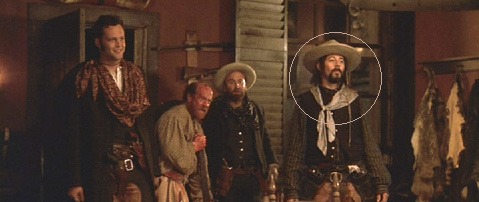| On the
other hand, these revisionist tales want us to know that the Ol' West
wasn't really like that. It was filled with dishonest, cruel, drunken,
illiterate rednecks who had faulty weapons, venereal disease, and poor
dental care. OK, I know that, but I think that a movie which reminds
us of those points has to do more than simply remind us. It has to
have an additional raison d'etre. It has to tell a good yarn,
or teach us something, or stir us, or provide good action. This film
doesn't really do any of those things.
It's really just 139
minutes of meandering, to shows us that the real old west was
meandering. It's 139 slow minutes of boredom, to show us the Ol' West
was boring. It's 139 minutes of ill-bred redneck behavior, drunken
mumbling, religious mumbo-jumbo, and raving lunatics, to show us that
the characters in the Ol' West were the lost of the earth, not unlike
the homeless population of today's big cities. The whole purpose of
the film is, more or less, to debunk the romance of the Ol' West. OK,
consider it debunked. I now know that only two things happened in the
Ol' West - mindless unjustified cruelty and pointless talk, both
punctuated by excess liquor. I also know that there were no likeable
people, and the violence was probably just there to kill the boredom.
And that was in the 139 minute version. Rumor has it that the original
version was longer than three hours. That would have meant a lot more
boredom, and therefore a lot more violence to kill the boredom.
Having said all that,
let me say that I watched the entire film through in one sitting, and
didn't really get that bored. It certainly still has plenty of scenes
that could have been trimmed or deleted. It could have been cut
another 20 minutes without losing anything at all. I don't know why
Billy Bob Thornton's character is in the movie, or that addle-brained
deputy in the first scene. But I also found it fascinating. The
cinematography creates a feel of isolated communities in the midst of
great open spaces, completely vulnerable to the large, roving outlaw
gangs that may wander through. The score evokes a sense of sadness and
loss. If it isn't a good movie, it does manage to accomplish some of
what it set out to do, and promises that Dwight Yoakam might do
something worthwhile if he'd concentrate on fewer jobs in the
production. |
DVD info from Amazon.
Widescreen anamorphic, 2.35:1
-
The
DVD is full of extras, but the transfer is grainy and
dark. behind the scenes, production commentary, deleted
scenes, etc.
|
|
You see, it was a
one-man vanity project for Yoakam. He wrote the story upon which it is
based. He adapted the story to a screenplay. He directed. He starred
in it. He wrote the original musical score. He made sandwiches during
the breaks.
Very strange film.
The scores at Apollo tell you a lot about it. The average member score
is 1. That's a perfect score, because their system doesn't have a
zero. Even more impressive, it's not 1 out of 4, or 1 out of 10, but 1
out of 100! That tells you it is not a mainstream crowd-pleasing kind
of film. On the other hand,
the Apollo reviewer scored it 72/100! That probably tells you it has a
certain appeal to a certain audience, and is not the complete piece of
trash indicated by the other ratings. In fact, several IMDb comments
praise it.
Let's face it, whether it has its
supporters or not, it isn't for everyone. |
The
Critics Vote
|
The People
Vote ...
- With their
votes ... IMDB summary: One of the worst. IMDb voters
score it 3.3/10, Apollo users score it a perfect 1/100
- With their
dollars ... it had a brief trial in 9 theaters in June.
It took in a paltry $15,000, and that was the name of that tune.
|
| IMDb
guideline: 7.5 usually indicates a level of
excellence, about like three and a half stars
from the critics. 6.0 usually indicates lukewarm
watchability, about like two and a half stars
from the critics. The fives are generally not
worthwhile unless they are really your kind of
material, about like two stars from the critics.
Films under five are generally awful even if you
like that kind of film, equivalent to about one
and a half stars from the critics or less,
depending on just how far below five the rating
is. My own
guideline: A means the movie is so good it
will appeal to you even if you hate the genre. B means the movie is not
good enough to win you over if you hate the
genre, but is good enough to do so if you have an
open mind about this type of film. C means it will only
appeal to genre addicts, and has no crossover
appeal. D means you'll hate it even if you
like the genre. E means that you'll hate it even if
you love the genre. F means that the film is not only
unappealing across-the-board, but technically
inept as well.
Based on this
description, this film is a D+ (Tuna). Scoopy says: that may be
the right score, or maybe as high as a C-. I don't know. Maybe
as low as an E. Even with all
the deletions, the pace is still too slow. Furthermore, the
narrative is choppy and often incomprehensible, so I see why
people hate it. I hate it too, but I am still impressed by
stretches of it and elements of it.
|
|

